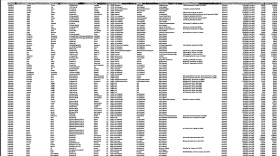Florida US Senator Marco Rubio is in New Hampshire today. It’s part of a two day visit that’s largely seen as an early campaign trip of sorts by a political figure hoping to win the Republican Party’s presidential nomination in 2016.
Rubio has made a number of moves ahead of an expected presidential bid – he’s hired staff in New Hampshire, and he’s also used his political action committee to donate money to state and local officials and candidates, in this state and others that hold early primaries and caucuses.
Michael Beckel is a reporter with the Center for Public Integrity in Washington. He analyzed the PAC spending in New Hampshire and Iowa by six potential presidential hopefuls, including Sen. Rubio, and joined All Things Considered to look at the numbers.
In all, how much money are we talking about thus far from these potential presidential candidates?
Collectively, these six potential contenders doled out about $350,000 between Iowa and New Hampshire politicians and political groups, and about $190,000 of that went right here in the Granite State
Compared to some of the figures we hear in campaign fundraising, $190,000 may be relatively small. But when you're talking about giving that money to someone who's running for state representative or looking for another term in the state senate, a donation of five or ten thousand dollars can be pretty substantial.
Yeah, this money was used up and down the ticket. The politicians who are running for office in New Hampshire or in Iowa, they benefit from having somebody like a Senator Rand Paul or a Senator Marco Rubio or former Texas Governor Rick Perry coming in and headlining an event, headlining a rally, headlining a fundraiser. Those are big draws to get more people in the door and hopefully more money raised for their campaigns.
But the politicians themselves, the national figures who might be considering presidential bids, also are trying to build relationships and cultivate relationships with people on the ground in New Hampshire. Whether it was a US Senate race or a US House race or a state legislative race, all the way down to sheriff's race in many cases, the money adds up. And when you look across these political action committees, somebody like Rick Perry, for instance, his PAC only raised and doled out to politicians about $100,000 in the last two years. But nearly 95 percent of that giving went to New Hampshire or Iowa politicians. So when he gave, he was giving very strategically in those two states.
Cultivating relationships with local figures, local political officials - there's that popular perception that these donations are made strictly to get endorsements from the local officials. The candidates say that's not the case, and the recipients of the donations don't necessarily give endorsements. What's the actual mutual benefit involved here?
Everything the national figure can do to help invest in the party and the party's performance in the state will pay dividends down the road. A lot of times these PACs might have specific platforms - whether it's a national security focus, or a conservative, pro-growth, pro-business agenda - they are politicians that are trying to support like-minded candidates. And if that has the added benefit of building up some goodwill and forging relationships, so the next time they're in New Hampshire or the next time they call, the local politician's going to remember who they are and know a little bit more about what it's like working with them.







